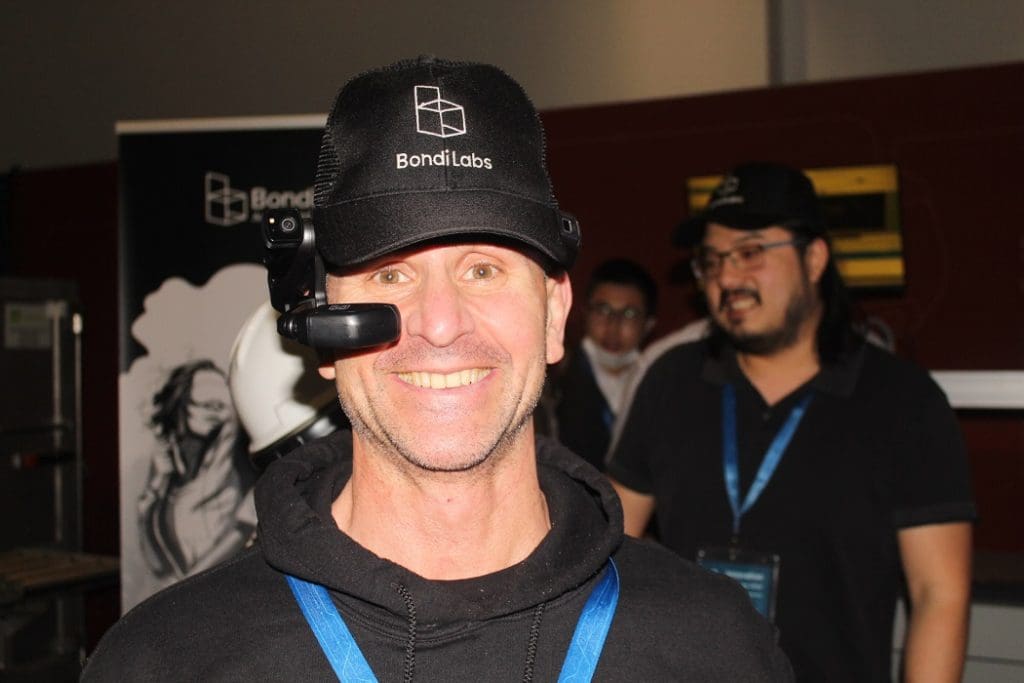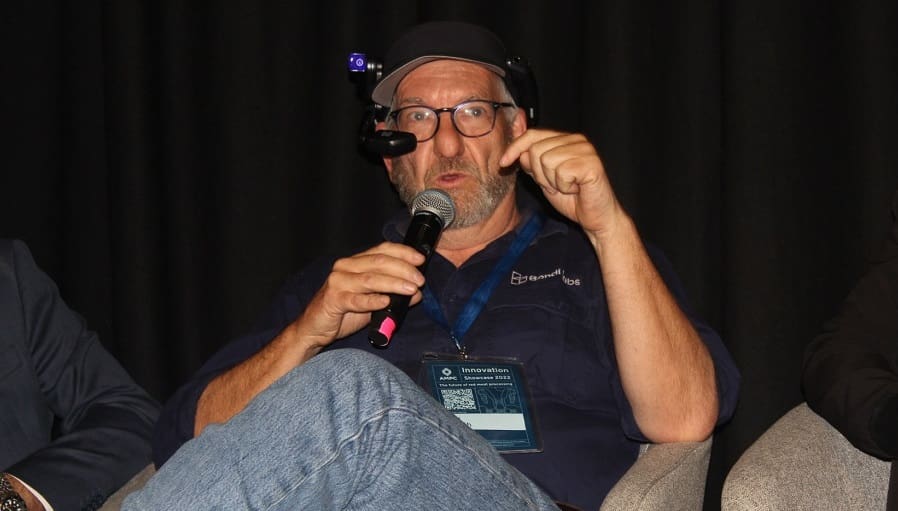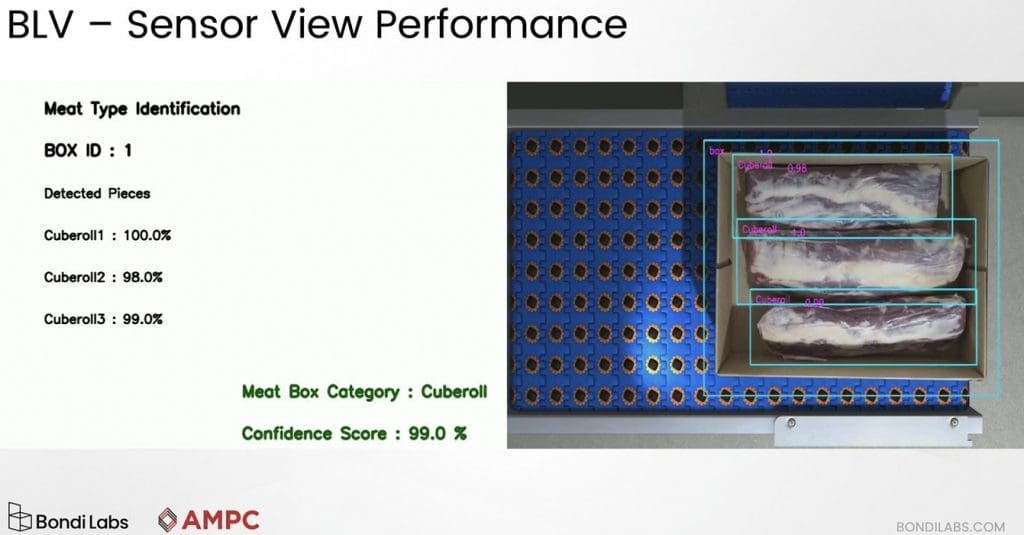
A smart glass-ready Bondi Labs general manager Jonathan Marshall.
SMART glasses with voice-activated camera and artificial intelligence (AI) capabilities could be the next tool to enhance Australia’s biosecurity, by augmenting limited veterinary resources before and during an exotic disease incursion.
Bondi Labs general manager Jonathan Marshall was at the recent inaugural Australian Meat Processing Corporation Innovation Showcase demonstrating the latest remote inspection and training technology.
This included the company’s cloud-based Elixar remote inspection software system that can run on almost any device, though Bondi Labs has focused initially on smart glasses giving the best remote inspection experience for the wearer and the observer ie the remote vet or food safety auditor.
“Smart glasses are much better than holding a mobile phone as you very quickly realise how valuable having two hands is.”
Bondi Labs has a background in developing virtual and augmented reality training with the Federal Government and several large companies including Chevron, DB Schenker and Bunnings.
In a joint venture with the Chinese Academy of Inspection and Quarantine, Bondi Labs’ Elixar system enabled Chinese Government food safety inspectors to successfully perform remote inspection trials of an Australian red meat processing facility – Teys – without the inspectors having to travel out of their country.
During the COVID pandemic, the same system has been trialled by government and third-party auditors to collaborate with onsite QA personnel to perform remote inspections avoiding the need for auditors to go from plant to plant potentially creating disease spread.
“You can start to see numerous economic and operational efficiencies; for example, why do low risk processors with no food safety issues need to be audited over and over when the cost of being audited is not small and there are also auditor shortages?
“Couldn’t an audit potentially be done just once, being simultaneously observed by multiple inspection bodies to cut down on excessive audit duplication?” Mr Marshall said.
“Currently there is limited visibility into what happens in an onsite audit which is still based on someone walking around a facility and writing up a report at the end of it.
“Using smart glasses, we could potentially record the onsite audit for evidence compliance purposes and then run AI over that video to automatically capture anything that might be deemed a non-compliance issue to augment the human auditor,” he said.
“Australia is a world leader in food safety and by augmenting and digitizing the onsite audit processes we can make food safety compliance a major competitive advantage.”
A solution to Australia’s limited veterinary resources
Bondi Labs’ remote inspection system could run on almost any device including drones to monitor livestock or even robots like Boston Dynamics’ robotic dog Spot which was demonstrated at the showcase, Mr Marshall said.
“You could have fixed cameras observing animals trying to detect lameness or Foot and Mouth Disease, because we simply don’t have enough veterinarians in rural Australia.”
“In fact, people with expertise in Foot and Mouth Disease etcetera are just not where you need them when you need them – it’s a real concern.”
Mr Marshall said the shortage of vets with production animal health expertise is getting worse, with most graduating vets wanting to work with cats and dogs in metropolitan areas as being a rural vet is hard work.
He said people with animal health skills in rural areas, including paraprofessionals such as veterinary nurses, wearing smart glass headsets could conduct livestock inspections while livestreaming footage and being guided by a vet in front of a computer screen anywhere in Australia.
This is all about connecting veterinary experts to people in the field to ensure effective animal health and welfare services are delivered when and where needed, Mr Marshall said.
Mr Marshall said the Department of Agriculture Forestry and Fisheries (DAFF) acting Deputy Secretary for Trade Nicola Hinder, who is also Chair of the Codex Committee on Food Import and Export Inspection and Certification Systems, is leading global efforts to develop international guidelines for remote auditing in agriculture that will significantly help create the trust and confidence needed for adoption of this emerging verification approach.
“Of course, we want to move faster and industry wants to move faster, but as the regulator, the government does need to move forward cautiously and methodically as they also need to work with importing country governments on this.”
“Though because of the many benefits of remote auditing, I think it is just a matter of timing, and in fact earlier this month there was a major global food safety event in Vienna led by Nicola and sponsored by DAFF that was all about remote auditing,” he said.
“I think the feedback from 30-odd different country regulators from around the world probably gave them (the Federal Government) the confidence that remote auditing is actually going to be a thing in the near future, which presents an opportunity for Australia to become a world leader in remote auditing technology.”
Box label verification for supply chain traceability

Bondi Lab’s Dr Stu Smith.
Innovation showcase participants were treated to a demonstration using smart glasses for box label verification in meat plants, to ensure a box’s contents are accurately described.
Bondi Labs research and engagement manager Dr Stu Smith told showcase participants that, through funding by AMPC, Bondi Labs has investigated ameliorating or reducing any labelling/box content errors along the supply chain.
“We decided to build an automated computer system that can both look at the contents of a box, look at the label and make sure that those two bits of information go together.”
Despite likening meat packers to elite sports people operating in very cognitively challenging environments, he said errors would occur
He said there are also opportunities to use artificial intelligence and augmented reality to help new workers to recognise meat cuts and minimise errors.

Box label verification can improve inspection efficiency and transparency. Image – Bondi Labs.
Other ways to make use of computer vision and remote inspection technology, included quality assurance inspection with smart glasses that would provide prior vision of that box being packed.
“You could then increase the capability of a worker to inspect boxes at any point in the production line.
“I think that is an important way of thinking about traceability along the supply chain,” he said.
“Imagine if you could extend that to an importing country officer (who) might be wearing smart glasses looking at boxes coming off a container with some content information on the outside of the box.
“If we’ve got access to the data that’s been acquired throughout that box’s journey we might be able to bring that up into the person’s field of view, so without even opening up the box they could get access to a video showing this box was packed in this way on this date and potentially at this temperature or whatever.”
A focus on delivering ‘remote expertise’ where it’s needed
Dr Smith said Bondi Labs is working on how to deliver “remote expertise.”
“We know that in a country like Australia with such a large land mass and relatively few people we have a challenge in delivery of expertise into regional, rural and remote areas.”
He said a lot of jobs could be done by local people with some skills while connected with a remote expert to provide an ongoing immediate level of expertise. There were good opportunities to use remote inspection technology in animal welfare inspection and exotic animal disease detection, Dr Smith said.
